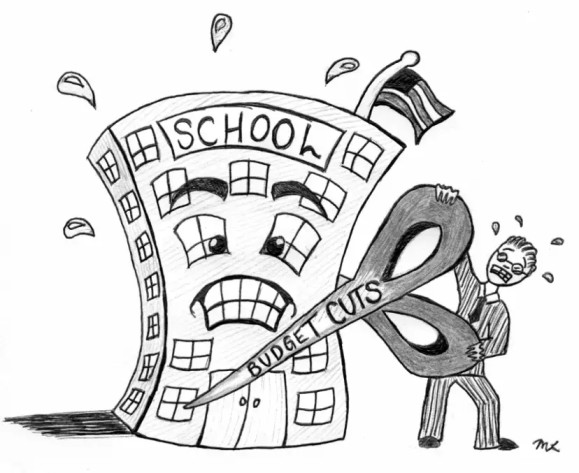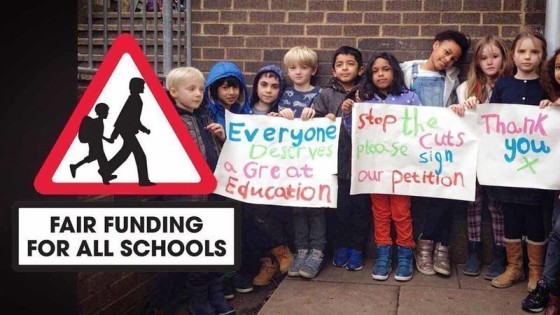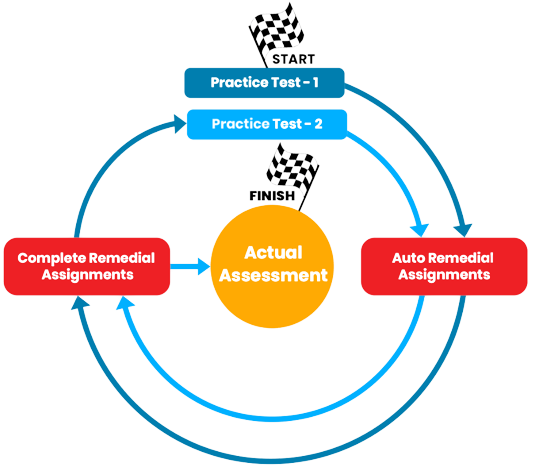As COVID Funding Ends Many Districts Face Looming Budget Problems
Here we sit at the beginning of 2023 and for us in education I would like to say the new start of a new year is filled with optimism. Certainly, there are some reasons for optimism such as COVID, if not behind us, being greatly reduced and allowing almost every student to return to in-person classes. But there are many reasons for concern such as spreading political conflict to school curriculum, staffing problems forcing schools to reduce the qualifications for hiring, and increasing focus on school security. But I would like to focus on a different issue that I think will likely define 2023 for us: budgets.
The United States will spend approximately $1 trillion dollars on K-12 education in 2023 which is about the same size as the entire military budget. More than 90% of this $1 trillion dollars comes from state and local governments. The federal government, supplemented its contribution to K-12 schools during COVID by $190 billion. That supplement has now ended with the requirement that the last of the funds be spent by the end of 2023. The reality for many districts is that these funds have already been spent or incumbered for capital projects.
So here we sit at the beginning of 2023 with pandemic-caused learning losses to make up for, greater demands for more school security, difficulty hiring qualified teachers without increasing their lagging salaries, and burgeoning needs of special education some of which seem COVID-related. Did I say, “Happy Holidays?”
It is not a bold prediction to say that state and local governments are not going to increase their education spending in 2023. To increase school budgets, governments would need to increase taxes and many governors and local officials have already declared that tax increases are not on the table any time soon. Inflation, even though it is showing signs of moderating, is real and making consumers feel poorer. Healthcare spending which is about 20% of the U.S. GDP is not going down and is likely to continue its march upward. Much of this uncontrolled healthcare cost burden falls on states.

Image Source: https://shashidreamfoundation.medium.com/lack-of-funding-for-education-5c79db2808ca
Perhaps the best we can hope for in 2023 is for school budgets to stay the same as they were pre-COVID. How will schools cope? Will they increase class size? Will they hire unqualified and untrained but less expensive teachers? Will they further eliminate supplemental programs such as music, art, and athletics? Yes, yes, and yes. They will do all these things and, most importantly, they will be forced to accept poorer learning outcomes.

Image Source: https://shashidreamfoundation.medium.com/lack-of-funding-for-education-5c79db2808ca
We simply can’t leave it there. As educators, as parents, and as citizens we need to keep our ambitions for education high. We all know how that education is the bedrock for making people who are happy and productive. The workforce of the future will require more highly educated workers. Managing everyday life will require lots more interaction with technology, simply being engaged citizens capable of contributing to intelligent societal discourse, and even making smart personal healthcare choices require being well-educated.
We have to look past budgets for the solutions. There are some tried and true solutions such as parents taking up more of the burden of education, and students looking for educational opportunities outside of schools such as those organized and paid for by local clubs, religious organizations, and national groups such as the Boy Scouts and Girl Scouts. These are solutions – as good as they are – that look to the past. We also need to look to the future.
The future of education is about technology – smart and engaging technology that produces measurable and accountable results in all areas of education. We have seen these for many years with language-teaching programs. We have seen them with online courses taught by highly engaging teachers that can replace or at least supplement classroom teaching. K-12 learning management systems have advanced by adding testing, feedback, and engaging gamified features that hold student attention.
Lumos Learning leverages the latest advances in education technology to create empathetic learning experiences and deliver measurable outcomes. We offer best-of-breed solutions, including state test preparation, summer learning, oral reading fluency program, writing skill improvement program, educator professional development platform, and more.
The Lumos print and online learning resources for state test preparation helps schools and districts increase student achievement in the year-end state assessments. Powered by the Lumos Smart Test Prep Methodology, students can master the state test format and get personalized remedial practice, boosting standards mastery and proficiency.

In addition, the Lumos Knowledge Assistant, a video-powered professional learning platform helps schools and districts to deliver and manage online teacher professional development programs at scale. It makes storing, organizing and offering on-demand access to your PD content super easy and efficient. The Lumos Knowledge Assistant is built to support educator professional development of every type, including periodic workshops, in-class observation, induction training, multi-day conferences, and more.
In a resource-constrained environment of education, what Lumos Learning and other edtech companies are doing provides me with the optimism I am looking for. We need new solutions. This is where the new solutions are. Happy New Year.











